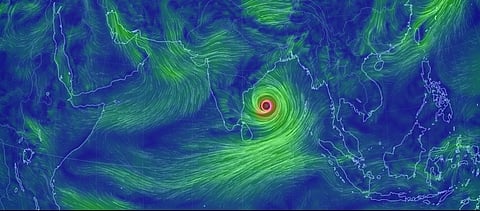

Cyclone Fani is only the second severe cyclone in the last 118 years to form in the Bay of Bengal (BOB) in the month of April and cross over to the Indian mainland, according to data from the India Meteorological Department (IMD). “The last severe cyclone, Nargis, devastated Myanmar in 2008,” said M Rajeevan, secretary of the Ministry of Earth Sciences on Twitter.
He further added that “in between 1891-2017, only 14 severe tropical cyclones formed in April over BOB and only one storm crossed the Indian mainland.”
April cyclones are rare and the track and severity of Fani makes it even rarer. In recent times, cyclones have either had unusual timing, like Cyclone Pabuk in January, or they have intensified rapidly before making landfall, like Cyclone Ockhi in 2017 and Cyclone Titli last year.
In fact, the IMD in October last year, had called the formation of the two very severe cyclones—Titli and Luban—on two sides of the Indian mainland as the ‘rarest of rare’ occurrences. The IMD had also said that the movement of both these storms was unique. While Titli changed its direction and moved towards the northeast after making a landfall, Luban too kept going in different directions over the nine days that it travelled through the south-eastern Arabian Sea towards Yemen and Oman on the Gulf of Oman coast and then made landfall on October 13.
More than normal sea surface temperatures due to global warming and the weak El Nino conditions in the equatorial Pacific Ocean could be possible reasons, say scientists. The tracks could be unpredictable due to abnormal wind shear. More research is required to be able to ascertain the exact cause for the unusual behaviour of cyclones.
Seas and oceans have been unusually warm this March. Globally, the month of March 2019 was the second-hottest ever recorded since observations began 140 years ago, according to the National Oceanic and Atmospheric Administration (NOAA).
“Record hot temperatures in the first few months were felt across parts of Australia, northern Alaska, northwestern Canada, southern Brazil, the Barents Sea, the Tasman and East China seas, and in scattered areas across all the southern oceans,” said NOAA in a press release.
The increasing ocean temperatures gave rise to two cyclonic storms in March. While Idai had an impact on the coast of Mozambique in southern Africa, tropical storm Iba was the first to form in the South Atlantic Basin since 2010.
On the morning of April 30, Cyclone Fani was situated about 700 km east-southeast of Chennai (Tamil Nadu) and 760 km south-southeast of Machilipatnam (Andhra Pradesh). It has already intensified into a severe cyclonic storm and into a very severe cyclonic storm by evening. After that, it is very likely to move northwestwards till May 1 and thereafter re-curve north-northeastwards towards the Odisha coast.
It is likely to make landfall on the Odisha coast between Puri and Kendrapara on the evening of May 3. The cyclone has been put in the category of ‘Extremely Severe’ cyclones because of the heightened wind speeds.
When landfall happens, wind speeds of 170-180 kilometres per hour (kmph) gusting to 200 kmph have been predicted by IMD over the Odisha coast and 90-100 kmph gusting to 115 Kmph over adjoining districts of north Andhra Pradesh. Fishermen have been advised not to venture into these areas.
Odisha is bracing up to receive the super storm. “The exact place of impact has not been ascertained yet. We are still assessing how many people will be affected and accordingly, we are making arrangements for cyclone centres and evacuation process. Twenty Odisha Disaster Rapid Action Force (ODRAF) units, 335 fire services and 12 National Disaster Response Force (NDRF) units are also ready,” said Bishnupada Sethi, Odisha special relief commissioner. “All district collectors are being kept informed and precautions are being taken”, he added.